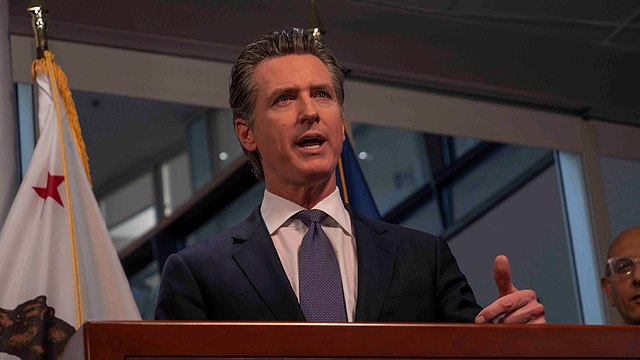Gov. Gavin Newsom unveiled his revised state budget proposal May 14, including a $100 billion economic recovery plan and scores of one-time spending thanks to a nearly $76 billion projected surplus.
The $267.8 billion budget includes a $196.8 billion general fund and is roughly $41 billion more than the initial budget Newsom proposed in January.
The increase in proposed spending was made possible by the state receiving billions more dollars in tax revenue than expected over the last year as the state’s wealthiest residents got even wealthier, according to Newsom and state budget officials.
“That (recovery plan) is the biggest economic recovery package — period, full stop — in California history,” Newsom said.
Newsom spent the week leading up to the announcement teasing bits and pieces of the budget and the recovery package, which he has dubbed the California Comeback Plan.
The plan includes sending $600 stimulus checks to state residents who made up to $75,000 last year, spending billions to assist with rent and utility bills that have gone unpaid due to the coronavirus pandemic, making pre-kindergarten available to all 4-year-olds in the state and some $4 billion in relief grants for small businesses.
Newsom touted the budget’s $93.7 billion in public education funding as the most ever allocated to schools by the state.
That figure also does not include some $15.3 billion in federal education funding and another $8.1 billion in tax revenue that could be funneled to education spending via the “Gann limit,” a 1979 voter-approved ballot measure that puts an annual limit on government spending.
When the limit is reached, the remaining money must be returned to taxpayers. The roughly $12 billion that will fund the $600 stimulus checks is also part of that strategy to disperse money that surpassed the Gann limit, according to state officials.
The education funding would amount to roughly $14,000 per student across the state, double what the state was spending per student a decade ago, according to Newsom.
The state would spend $900 million in 2022-2023 and $2.7 billion in 2024-2025 under the plan to make pre-kindergarten universally available. Some 250,000 students would gain access to pre-K once fully implemented, Newsom said.
The budget includes $3.3 billion to train and support the additional teachers needed to expand the availability of pre-kindergarten and cut the ratio of pre-K students to teachers from 24-to-1 to 12-to-1.
“We want to make public schools essential,” Newsom said. “We want to make them competitive. We want to make our public education system enriching. We want to make our public education system what it’s capable of being.”
The funding plan also includes $2 billion to open personal savings accounts for some 3.7 million low-income, foster, homeless and English-learning youth.
The savings accounts would be seeded with $500 base deposits for every student in the program and an additional $500 for students who are homeless or in foster care.
The accounts could eventually be used to help pay for college or start a business, Newsom said, noting that some studies have found that children with early financial access and planning are seven times more likely to go to college.broadband internet
“This is an opportunity to address generational poverty,” Newsom said. “This is an opportunity to stretch a college-going mind but also an opportunity to look at trade school and entrepreneurial spirit… because we recognize there are many pathways for our children.”
The budget proposal also includes billions to help unhoused residents get off the streets; build some 46,000 housing units for unhoused residents; clean the state’s streets, freeways and neighborhoods; install broadband internet across the state; modernize the state’s infrastructure; invest in clean and renewable energy sources; and invest in drought and wildfire preparedness and resilience.
Newsom framed the spending in the proposed budget as economic supports that will help the state’s economy come “roaring back” from last year’s nadir in the pandemic’s early days, which forced the state to make financial cuts to shore up a roughly $54 billion budget deficit.
The revised budget proposal, while released on schedule, also comes as Newsom faces an effort to recall him and multiple Republican candidates that have argued the projected surplus is so large only because the state taxes its residents too much.
State Republican Party Chair Jessica Millan Patterson said in a statement that the week-long budget rollout — which Newsom has done in the past — was a de-facto response tour to the recall effort and called him “shameless” for taking some credit in the state’s economic rebound.
“The only credit he and Democrats deserve is for California’s shuttered businesses, sky-high unemployment, deteriorating unemployment department, shrinking population, devastating homeless crisis and failing education system that is punishing students and parents through its union-first virtual schooling,” she said.
State Sen. Nancy Skinner, D-Berkeley, praised Newsom for the revised budget proposal’s priorities.
“Thank goodness California is in the position to make transformative investments to end family homelessness, lift those hurt by the pandemic and properly fund our schools,” said Skinner, the chair of the Senate Budget Committee.
“Gov. Newsom’s proposed budget does that and more and complements the state Senate’s priorities,” she said. “Let the negotiations begin.”
Full details on Newsom’s revised budget proposal can be found at http://www.ebudget.ca.gov.
Newsom and the state Legislature will have until June 15 to approve the budget before the new fiscal year begins on July 1.



 Activism4 weeks ago
Activism4 weeks ago
 Activism4 weeks ago
Activism4 weeks ago
 Alameda County4 weeks ago
Alameda County4 weeks ago
 Activism4 weeks ago
Activism4 weeks ago
 Alameda County4 weeks ago
Alameda County4 weeks ago
 Activism4 weeks ago
Activism4 weeks ago
 Activism4 weeks ago
Activism4 weeks ago
 Activism3 weeks ago
Activism3 weeks ago


















































